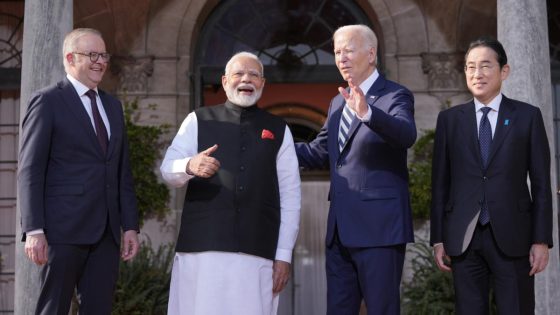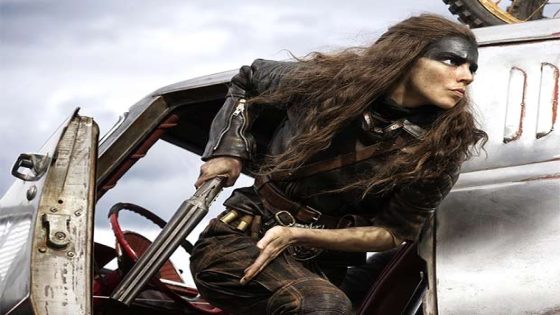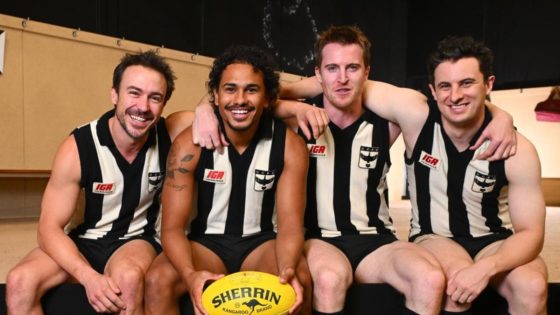Leaders from Australia, the United States, Japan and India have focused on ensuring their Quad partnership outlasts global upheaval and elections in their nations during a highly personal meeting in Joe Biden’s old school.
Prime Minister Anthony Albanese, Mr Biden, Japanese leader Fumio Kishida and India’s Narenda Modi all emphasised the strength of the four-way partnership in their opening remarks before the closed-door talks in Delaware on Saturday.
The leaders also canvassed meaty matters including the rise of China and how to offer practical support to countries in the Indo-Pacific to protect their maritime security.
In a step up of the Quad’s security cooperation, Australian Border Force personnel will serve on a US Coast Guard vessel from next year, along with sailors from Japan and India, and the four countries will cooperate on maritime aerial patrols to keep track of activities such as illegal fishing and transnational crime.
The group faces significant upheaval as Mr Biden and Mr Kishida are retiring from politics within months and Mr Albanese will also face an election likely before the Quad next meets.
“While challenges will come, the world will change, because the Quad is here to stay, I believe, here to stay,” Mr Biden said after welcoming the other leaders.
He earlier told reporters the Quad would survive “way beyond November” and the US election where Donald Trump and Kamala Harris are vying to become the next president.
Mr Albanese said he believed “the sum of the four individual parts” of the countries coming together makes their joint work more effective.
“Unlike some international forums, the Quad … doesn’t have a long history. That means it’s not defined by tradition but it also means it’s not confined by it,” he said.
“It means that as it develops, it can evolve – and that is, I believe, what is happening.”
The Quad first formed as a coordination mechanism in the wake of the 2004 Indian Ocean tsunami. Mr Biden boosted it to a leader-level gathering after he took the presidency in 2021 and it has met five times since.
The president is now seeking to cement his leadership in elevating the US foreign policy focus on the Indo-Pacific, with the emphasis he places on the region seen as a counter to the rise of China
Mr Modi noted that Saturday’s meeting came at a time when there would was “surrounded by conflicts and tension”.
But he insisted that “we are not against anybody”, despite China’s ongoing alarm about the alliance.
The Indian prime minister switched from Hindi to English to add, “Our message is clear: Quad is here to stay, to assist, to partner and to compliment.”
Mr Albanese said Australia saw the Quad as a key instrument to promote regional stability and that it was about achieving practical and meaningful outcomes.
Saturday’s meeting was held at Archmere Academy, under a stained glass roof depicting clouds and vines in the lobby of the 1918 building that was originally the homestead of businessman John Raskob.
Mr Biden attended the Catholic high school, as did his three children. It was also the location of the funeral for his eldest son Beau, who died in 2015 of brain cancer and inspired the President’s cancer moonshot which now incorporates a Quad initiative.
Ahead of the meeting, four US congress members teamed up to form bipartisan Quad caucuses – similar to Australia’s parliamentary friendship groups – and back in the diplomatic grouping for the long term.
Republican senator Tammy Duckworth said the Quad represented America’s “steadfast commitment” to the prosperity, strength and stability of the Indo-Pacific.
“Together, we’re sending a strong message to our allies and partners – and our competitors – that the United States is here for the long haul,” she said.
In a side meeting with Mr Kishida, Mr Albanese assured his counterpart that Australia would remain a reliable energy supplier into the future.
Japan has been concerned over the past year or so about Australia’s moves towards phasing out gas because it is heavily reliant on gas imports for its power generation.
Source Agencies




